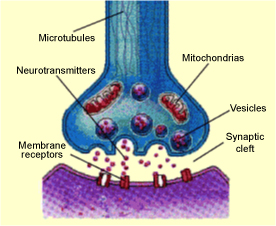 It’s been only about a quarter of a century since we discovered that, contrary to what we’d thought for decades prior to that time, the brain actually sends signals from one neuron to another by means of chemical molecules, called neurotransmitters. That discovery has enabled us to put together the pieces of the puzzle of addiction in a way that we simply hadn’t been able to do before we knew about these amazing chemical messengers.
It’s been only about a quarter of a century since we discovered that, contrary to what we’d thought for decades prior to that time, the brain actually sends signals from one neuron to another by means of chemical molecules, called neurotransmitters. That discovery has enabled us to put together the pieces of the puzzle of addiction in a way that we simply hadn’t been able to do before we knew about these amazing chemical messengers.
Brain Neurotransmitters
Once we’d begun to understand how brain neurotransmitters work, we also began to understand how they control our moods, memory, thinking, and behavior. Each of our brain cells is a tiny but very powerful manufacturing plant that assembles these chemical molecules out of nutrients and passes them along to other neurons. When our brains have enough of the nutrients necessary to manufacture all of the neurotransmitters we need, we’re able to feel relaxed and alert, focused and free of fear, happy and pain-free. In short, when our brains have the nutrients they need to create neurotransmitters in the necessary quantities, we’re most fully alive, engaged, and productive.
Neurotransmitters and Addiction
When we’re unable to produce these chemical messengers in the necessary quantities, our moods, intellectual capability and behavior tend to deteriorate. We’re often unable to focus, we tend to worry about things that we probably shouldn’t be concerned with, we’re not “up” and alert and happy, and we have difficulty coping with pain, whether the pain is physical or emotional.
If neurotransmitter deficiencies persist over time, we’re often led to use prescription drugs, alcohol, so-called “street drugs”, and other substances, including nicotine, to substitute for our transmitter shortages. These drugs are capable of temporarily alleviating the symptoms of neurotransmitter deficiencies, but continued use of these substances can, often quite quickly, result in addiction, a situation in which our brains adapt and begin to rely on these transmitter substitutes to keep us going.
The problem is, of course, that drugs and alcohol are enormously harmful to us in so many ways. Rather than enabling us to function, they actually reduce our ability to perform without them. They alter our behavior and reduce our ability to experience the normal emotions of life. They ultimately cause depletions or diminished effects of the very neurotransmitters which they are meant to mimic or bolster.
Although the disciplines of medicine and psychiatry have understood neurotransmitters and how they work for quite some time, the primary use they’ve made of this information is to find ways to use prescription drugs to do the job that, prior to the biochemical revolution, could only be found through illicit drugs and legal substances such as alcohol and tobacco.
They’ve given us Ritalin to control our kids’ Attention Deficit Disorder (ADD), and Ritalin works in the brain in exactly the same way as cocaine. They’ve given us antidepressants such as Paxil and Prozac, which work in the brain to eventually shut down one of our most important neurotransmitters, a natural brain chemical that keeps us happy and relaxed.
In short, they’ve pioneered “drug interventions.” They’ve found ways to prescribe dozens, if not hundreds, of additional substances to which we can become very rapidly addicted. Indeed, the prescription drug problem in the United States is now much more severe and deadly than that of illicit drugs, and one of the main differences is that drug companies can now advertise their addictive drugs, which drug dealers can’t. Young people now need go only as far as their parents’ medicine cabinets to procure drugs that are often equally as powerful and addictive as those they can buy on the street.
(The above information was extracted from Dr. CE Gants’ book, .)
If you have a drug abuse problem, know that real solutions are available that work. Check these sites for your answers:
AddictionSolutionCenter.com
cegant.com
0 responses so far ↓
There are no comments yet...Kick things off by filling out the form below.
Leave a Comment